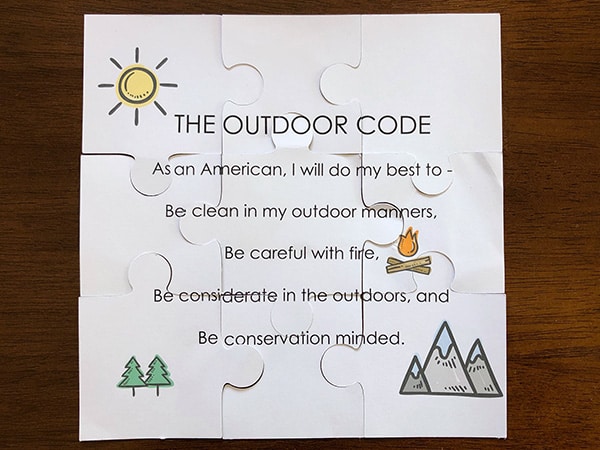|
Developing a deep respect for the plants, animals, land, water, and other essential parts of Nature and the Outdoors as well as protecting and preserving our natural world are fundamental aspects of Scouting...from its origin. The following pledges guide Scouts as they encounter the Outdoors to be sustainable and “leave no trace” or “leave it better than they found it.”
The Outdoor Code (originated in BSA Handbook, 1955) As an American, I will do my best to -- Be clean in my outdoor manners. I will treat the outdoors as a heritage. I will take care of it for myself and others. I will keep my trash and garbage out of lakes, streams, fields, woods, and roadways. Be careful with fire. I will prevent wildfire. I will build my fires only when and where they are permitted and appropriate. When I have finished using a fire, I will make sure it is cold out. I will leave a clean fire ring or remove all evidence of my fire. Be considerate in the outdoors. I will treat the land and other land users with respect. I will follow the principles of outdoor ethics for all outdoor activities. Be conservation-minded. I will learn about and practice good conservation of soil, waters, forests, minerals, grasslands, wildlife and energy. I will urge others to do the same. The Land Ethic (Aldo Leopold in “A Sand County Almanac”)
The 7 Leave No Trace Program Principles
Chief Rover Scout, Ken Pataky Learn more at: http://outdoorethics-bsa.org/programs/ https://www.scouting.org/outdoor-programs/outdoor-ethics/land-ethic/ https://www.treadlightly.org/ http://lnt.org
0 Comments
Your comment will be posted after it is approved.
Leave a Reply. |
R4LA BLOGA collection of Ponderings, Rover Essentials, and Video Blogs to help you on your Rovering journey.
AUTHORSOur authors are real Rover Scouts, members of R4LA, tested by time and many challenges, who rise to share our world with you. Come join us! ArchivesCategories
All
|


 RSS Feed
RSS Feed
